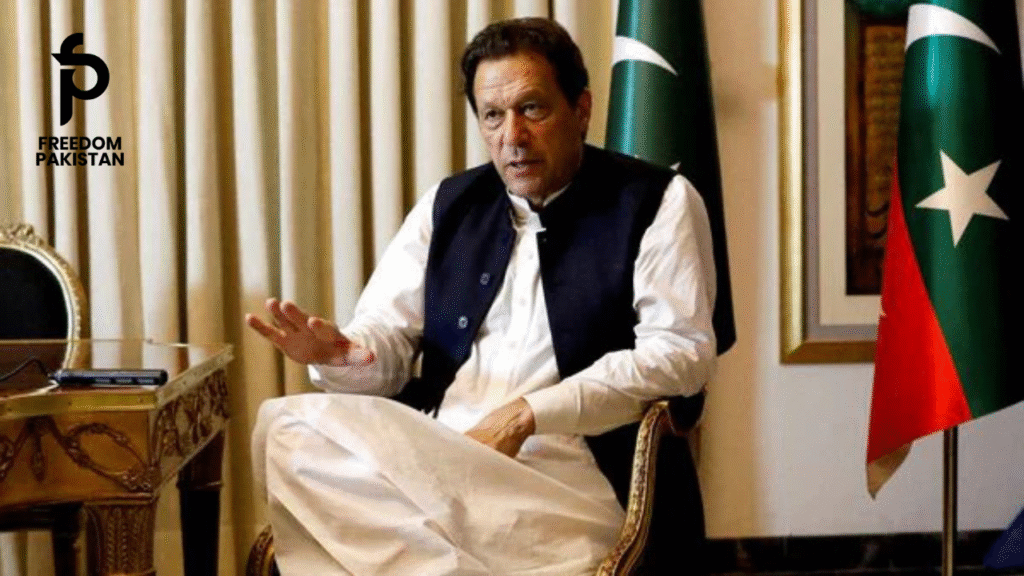I. Introduction
In recent legal proceedings involving Pakistan’s former Prime Minister Imran Khan, a controversial decision made by the Anti-Terrorism Court (ATC) has drawn considerable attention. The case revolves around several charges against Imran Khan, and the ATC’s suggestion that his refusal to undergo a polygraph test might weaken his defense has sparked debates among legal experts, politicians, and the general public. The polygraph, often called a “lie detector” test, has been proposed as a tool in an attempt to ascertain the truth in this high-profile case. Imran Khan’s decision to decline the request raises important questions about the nature of justice, the use of polygraphs in legal matters, and the possible consequences for the former prime minister’s case.
This article delves into the background of the case, the judge’s remarks, and the implications of this refusal, ultimately evaluating how this situation might impact both the legal proceedings and public perception.
II. Background
Overview of Imran Khan’s Legal Issues
Imran Khan, the leader of the Pakistan Tehreek-e-Insaf (PTI) party, has found himself embroiled in numerous legal challenges since his ousting from the Prime Minister’s office in April 2022. From allegations of corruption and financial irregularities to charges related to sedition and anti-state activities, Khan’s legal battles have only intensified in recent months. His opposition to the incumbent government has led to a series of protests and clashes with the state apparatus, making his legal matters politically charged and controversial.
At the heart of one such case is a charge related to inciting violence through his speeches. The Anti-Terrorism Court (ATC) in Islamabad has been overseeing this case, which involves allegations that Khan’s public statements were designed to stir unrest, undermine the government, and challenge the judiciary’s credibility. The ATC, under the leadership of its presiding judge, has been tasked with determining whether these actions warrant severe penalties, including prison time.
The Role of the Anti-Terrorism Court (ATC)
The Anti-Terrorism Court was established in Pakistan to try cases involving terrorism and national security threats. These courts are specially designed to deal with cases where individuals or groups have engaged in violent or destabilizing actions that threaten the peace and security of the nation. The ATC judge’s statements regarding the polygraph test reflect the gravity of the charges faced by Khan, as well as the court’s determination to use all available means to uncover the truth.
Polygraph Test Demand
In the ongoing legal proceedings, the ATC judge ordered that Imran Khan undergo a polygraph test in order to ascertain the veracity of some of his statements made during the trial. The reasoning behind this request was to verify whether Khan’s statements had been truthful, particularly regarding his accusations of corruption and misconduct against political opponents, including the sitting government. The judge’s suggestion to conduct the polygraph test was aimed at removing any ambiguity about Khan’s public claims.
However, Imran Khan’s defense team opposed the polygraph request, arguing that the test would be an infringement on his rights and would not contribute to the core issues of the case. This refusal has since become a point of contention, with some legal experts suggesting that it might negatively impact Khan’s credibility in the eyes of the court and the public.
III. The Judge’s Statement
Details of the ATC Judge’s Remarks
In a ruling that garnered significant media attention, the ATC judge emphasized the importance of transparency and truthfulness in legal proceedings. The judge specifically pointed out that refusal to undergo a polygraph test could be interpreted as an indication of dishonesty or a lack of confidence in the veracity of one’s statements. This comment was delivered in the context of ongoing debates about the credibility of political figures and the need for clear evidence in cases involving high-profile individuals like Imran Khan.
The judge’s remarks were not just a procedural matter; they were aimed at sending a message about the importance of truth in legal battles. The polygraph, while not foolproof, is often considered a tool that can help determine whether someone is lying or not, especially when there are discrepancies in their testimony.
Reasoning Behind the Statement
The ATC judge’s reasoning for making such an assertion lies in the broader context of legal proceedings where the burden of proof falls on the accused. In criminal cases, especially those involving political figures, the need for clear, irrefutable evidence is paramount. The judge expressed concerns that the refusal to undergo a polygraph test could hinder the court’s ability to assess the case comprehensively.
From a legal standpoint, the polygraph test might have offered an opportunity to corroborate or challenge Khan’s testimony, potentially revealing whether his statements about the government and judiciary were made with honest intentions or driven by political motives. Refusing the test, therefore, might be perceived as an attempt to avoid clarity, and in the context of the charges against him, this could be seen as detrimental to his case.
Legal Implications
The refusal to take a polygraph test can have far-reaching legal implications. While polygraphs are not universally accepted as conclusive evidence in court, the refusal to take the test may be viewed by some as a sign of guilt or evasion. In Imran Khan’s case, where public opinion plays a significant role, this could translate into negative media coverage and a loss of political support, even if the legal implications are less severe. The court may interpret such refusal as indicative of a lack of willingness to cooperate fully with the judicial process, which could influence the judge’s assessment of his credibility and the overall strength of his case.
Sindh Govt to Sponsor Pakistan’s First Female Boxer Aaliya Soomro for Dubai Tournament
You Can Also Read This
IV. Imran Khan’s Refusal to Take the Polygraph Test
Reasons for Refusal
Imran Khan’s decision to reject the polygraph test is not without rationale. His legal team argues that the polygraph is an unreliable tool for determining truthfulness and should not be used as a measure of a person’s credibility in a serious legal case. In Pakistan, the use of polygraphs in legal proceedings is not as established as in some Western legal systems, where polygraph results are often treated with more skepticism. Khan’s defense team also contends that undergoing the polygraph test could potentially violate his rights, as it might be seen as an extrajudicial means of extracting evidence.
Additionally, Khan’s political strategy may have played a role in the decision. Given his status as a former prime minister and leader of a major political party, Khan is aware that public perception plays a crucial role in his legal battles. His refusal to submit to the polygraph might be aimed at positioning himself as a victim of a politically motivated judicial system, rather than someone trying to hide the truth.
Possible Legal Strategy
Khan’s refusal could be a calculated move in a broader legal strategy. By declining the polygraph test, Khan’s legal team may be attempting to shift the focus of the case away from peripheral issues like the polygraph and onto the core arguments regarding the legality of his charges. The refusal could be seen as an attempt to highlight the limitations of the judicial system and emphasize political persecution rather than factual inaccuracies in his statements.
Public Perception
In the court of public opinion, the refusal to undergo a polygraph test has already begun to shape the narrative surrounding Imran Khan’s case. Supporters of Khan may interpret the refusal as a reasonable defense against an intrusive and unreliable test, while his detractors could see it as an indication of guilt or dishonesty. Public perception of the polygraph refusal could have significant ramifications for Khan’s political future, influencing his supporters and opponents alike.
V. The Polygraph as Legal Evidence
How Polygraphs Are Used in Legal Cases
Polygraphs, or lie detector tests, have been employed in legal cases for decades, primarily to determine the truthfulness of statements made by individuals involved in a case. The test measures physiological responses such as heart rate, blood pressure, and respiration while the subject answers a series of questions. While some argue that polygraphs are an effective way to assess truthfulness, others maintain that they are far from foolproof and can be easily influenced by stress or anxiety, regardless of whether the individual is being truthful.
In Pakistan, the use of polygraphs in legal cases is not a standard practice. This makes Imran Khan’s case particularly noteworthy, as it highlights the growing role that such tools may play in modern legal proceedings. The request for the polygraph test is part of a larger trend toward relying on scientific methods to corroborate testimony and assess the credibility of witnesses.
Reliability and Controversies
The controversy surrounding polygraph tests stems from their questionable reliability. Critics argue that polygraphs are not scientifically proven to be accurate, with false positives and negatives being common occurrences. Despite this, polygraphs remain a tool used by many law enforcement agencies around the world to assess truthfulness in criminal investigations. Whether or not the results of a polygraph would hold up in court as definitive evidence is another matter entirely.
In Khan’s case, the polygraph’s potential value lies in its ability to provide an additional layer of evidence, but not necessarily one that would definitively determine his innocence or guilt. The refusal to take the test, therefore, may not be as significant as some may believe, but it certainly plays a role in how the case is perceived.
Potential Impact on Imran Khan’s Case
The refusal to take the polygraph test could have varying degrees of impact on Khan’s legal situation. On one hand, the court may view it as a sign of evasion, leading to negative perceptions. On the other hand, the defense team could argue that the polygraph is an unreliable method that should not be considered in the final verdict. Ultimately, the decision may not significantly alter the core arguments of the case but could influence the broader political landscape in Pakistan.
VI. Reactions from Legal Experts and Politicians
Expert Opinions
Legal experts have expressed differing opinions about the implications of Imran Khan’s refusal to undergo the polygraph test. Some have argued that while the polygraph may not offer conclusive proof of truth, the refusal to take the test might raise doubts about Khan’s credibility in the eyes of the court. Others maintain that the test is irrelevant to the core issues at hand and that Khan’s decision should not negatively affect the legal proceedings.
Political Reactions
Politicians have been quick to weigh in on the matter, with some backing Khan’s decision as a principled stance against the perceived biases of the judicial system. Others, particularly from opposing political factions, have suggested that the refusal indicates a lack of transparency and raises concerns about the veracity of Khan’s statements. These reactions are deeply tied to Pakistan’s polarized political environment, where legal matters often intertwine with political agendas.
Public Debate
The polygraph refusal has sparked a larger debate about the intersection of law, politics, and justice in Pakistan. Supporters of Khan argue that the refusal is a legitimate move to protect individual rights, while his critics see it as a political maneuver designed to shift focus away from the merits of the case.
VII. Conclusion
The controversy surrounding Imran Khan’s refusal to undergo a polygraph test is a significant development in his ongoing legal battles. While the polygraph itself may not be the ultimate determinant of guilt or innocence, the refusal to take the test is a move that could have profound implications for the political and legal narrative surrounding Khan. The ATC judge’s comments suggest that this refusal may weaken Khan’s case in the eyes of the court, but whether it will influence the final outcome remains to be seen.
As the case continues, it is clear that both the legal and political ramifications of this decision will continue to unfold, shaping public opinion and the broader discourse on justice in Pakistan. Khan’s legal team will undoubtedly continue to defend their stance, while the judiciary will seek to navigate the complexities of this high-profile case in the face of immense public and political pressure.




